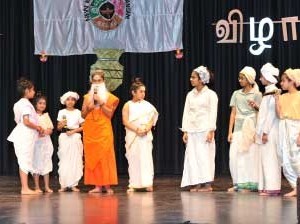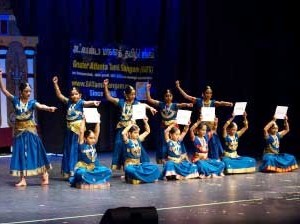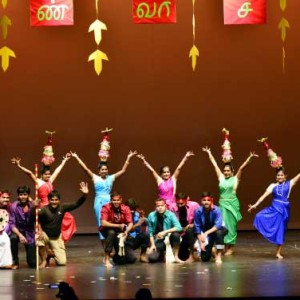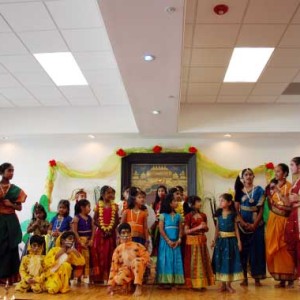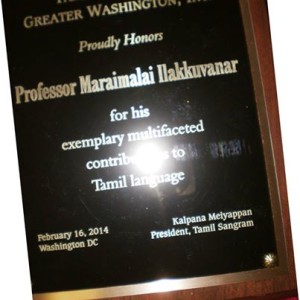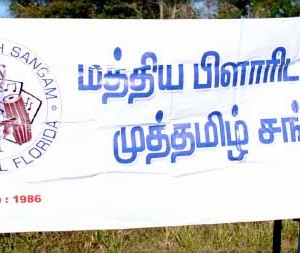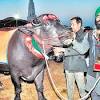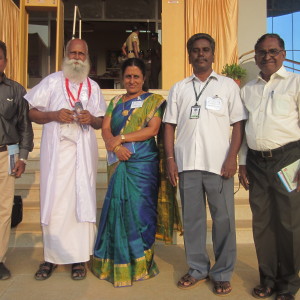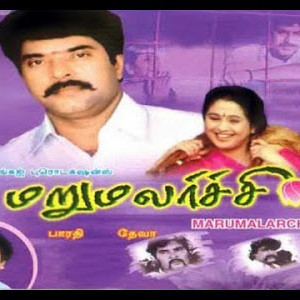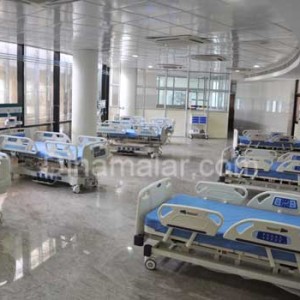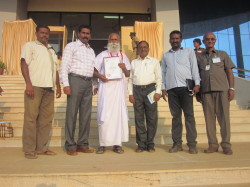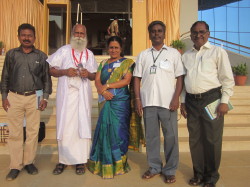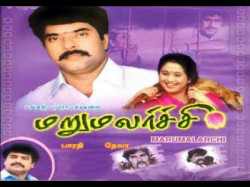EU terror ban on LTTE challenged
[TamilNet, Wednesday, 26 February 2014, 17:51 GMT]
The European Union's ban on the Liberation Tigers of Tamil Eelam
(LTTE) hangs in the balance today after a hearing at the European Court
of Justice (ECJ) in Luxembourg exposed serious flaws in the original
evidence used to proscribe the movement in 2006. Judges expressed
concern at the European Council's use of an Indian anti-terror law as a
suitable precedent for banning the LTTE, saying there was no evidence
that the Council checked if terror suspects had access to a fair trial
in India. The court was also dismayed by the Council's use of Wikipedia
as a credible source for keeping a terrorism ban on the LTTE. Lawyers
for the LTTE left the court in a positive mood, expecting a judgement
within the next six months.
Representatives
from the European Council, European Commission, Netherlands and Britain
all defended the inclusion of the LTTE on the EU's terrorism list.
A
Sri Lankan government delegation also observed the proceedings, and the
court room was packed with over a hundred diaspora Tamils.
Victor
Koppe, the Amsterdam-based attorney for the applicant, told the court
that, “There can be hardly any doubt that the LTTE was fighting a
legitimate struggle against an extremely oppressive regime which some
have even labelled as genocidal.”
Koppe compared Sri Lankan
President Mahinda Rajapaka with Syrian leader Bashar Al-Assad, before
reminding the court about Britain's chequered stance on terrorism: “the
same government that stands before you today was once quite keen on
labelling Mandela a terrorist and not a legitimate fighter against an
oppressive regime.” The UK delegation said it noted Koppe's comments on
British foreign policy but said it was outside the scope of this hearing
for the UK to respond.
Koppe concluded that “the refusal to
delist the LTTE prevents the Tamil diaspora from organising itself into
an effective partner in the defence of Tamil rights through political
means.”
Koppe's argument hinged on four key points. Firstly, that
the LTTE were combatants in an armed conflict and as such should have
been governed by international humanitarian law not anti-terrorism
mechanisms. Next, Koppe's team took issue with the authenticity of
sources used by the Council to justify its ban on the LTTE, which
included Wikipedia pages. Thirdly, the Council's reliance on India and
Britain's decision to ban the LTTE was questioned. Lastly, Koppe argued
that the factual situation had changed following the military defeat of
the LTTE in 2009 and the absence of any attacks for almost five years.
The
Dutch government delegation said parties to an armed conflict were
still governed by other laws, citing this in defence of the conviction
of five Tamils in the Hague in 2011 for LTTE fundraising, and adding
that senior judges in Germany and France had reached similar
conclusions.
The European Commission said that the LTTE did not
pose a terrorism risk in the future provided the asset freeze remained
in place. Otherwise, there was a likelihood that the LTTE would resume
fighting when they recovered the capability.
The UK said it was
legitimate for their Home Secretary, rather than an independent judge,
to have banned the LTTE in 2000. Furthermore, evidence could be withheld
from Parliament when passing anti-terror legislation. The four-strong
UK delegation refused to comment when TamilNet approached them after the
hearing.
Judges
spent two hours questioning the parties, directing the majority at the
European Council. The judges said there was no evidence that the Council
had checked the fundamental rights situation in India before making the
contested decision in 2006 to ban the LTTE. The court doubted whether
there was due process in India to challenge a ban on the LTTE there, in
which case any judgement was not compatible with EU standards. European
Council countered that the ban would have passed based on the UK
position alone, regardless of the ban in India.
The judges were
also dissatisfied that the Council's evidence for a terror ban on the
LTTE included a list “contextual material based on well publicised
events”, some of which were internet references and Wikipedia pages
about terrorist acts allegedly committed by the LTTE.
The
advocate for the European Commission mentioned in passing during his
closing remarks that a colleague had nearly been killed by the LTTE.
Chronology:
+++++++++++++++++++++++++++++++++++++++++++++++++++++++++++++++++++++++++++++
Tamils cautioned against word trick of OHCHR
[TamilNet, Tuesday, 25 February 2014, 23:11 GMT]
Tamils living world over should take a careful note on who is
skipping away from including the demand for an ‘international
investigation’ in the draft resolution to be placed at the UN Human
Rights Council this March, Tamil activists in the island told TamilNet
on Tuesday. The diaspora Tamils and Tamils of Tamil Nadu should not be
carried away by the ‘media discourse’ in Colombo following the latest
recommendations of the UN Human Rights High Commissioner Navanetham
Pillay, the activists warned. The latest phrase ‘international inquiry
mechanism’ could also imply a process of questioning or fact-finding
mission by UN Special Rapporteurs under the human rights regime of the
UNHRC, which would only end up adding just another report to the
existing piles of UN reports. Tamil lobbyists abroad should not deceive
the masses by their misinterpretations of the terminology, the activists
said.
An ‘international investigation’, which Tamils demand is a mechanism
that comes under an existing international court or a UN special
tribunal constituted to the specific purpose of investigating the
alleged crime of genocide against Eezham Tamils, an act that should be
taken up by the UN Security Council.
A resolution in the UNHRC
calling for international investigation would clearly place the
responsibility at the hands of the UN Security Council.
The question is whether the draft resolution would have a specific and legally binding demand on ‘international investigation’.
The
USA is not prepared to add the demand for international investigation
in its draft resolution, informed diplomatic sources in Colombo said at
the time of this writing.
At this juncture, Eezham Tamils in UK
should demand the British government to prove its credibility by placing
a draft resolution calling for international investigations as the
British Prime Minister David Cameron has earlier gone on record stating
that he would be calling for international investigations on Sri Lanka,
the Tamil activists in the island said.
In 2013 February, Ms
Navi Pillay came with the following paragraph at the end of her
recommendations in the annual report (A/HRC/22/38):
“64. The High Commissioner noted the views expressed by many
stakeholders in Sri Lanka, including prominent community leaders, that
the attention paid by the Human Rights Council to issues of
accountability and reconciliation in Sri Lanka had helped to create
space for debate, and catalyzed positive steps forward, however limited
at this stage. The High Commissioner encourages the Council to continue
its engagement and build on this momentum. In this regard, she reaffirms
her long-standing call for an independent and credible international
investigation into alleged violations of international human rights and
humanitarian law, which could also monitor any domestic accountability
process.”
In 2014 February, Navi Pillay’s report has come
with the following paragraph in the beginning of her recommendations in
the latest annual report (A/HRC/25/23):
“74. The High Commissioner recommends that the Human Rights Council
establish an international inquiry mechanism to further investigate the
alleged violations of international human rights and humanitarian law
and monitor any domestic accountability processes. OHCHR stands ready to
assist in such a process.”
External Links:
++++++++++++++++++++++++++++++++++++++++++++++++++++++++++++++++++++++
India and world needs prod to recognize, act on Tamil genocide
[TamilNet, Monday, 24 February 2014, 15:36 GMT]
Finding fault with the USA and EU for spoiling negotiated solution by
banning the LTTE, the former head of SLMM says that North America and
Western Europe lack interest in what is happening in the island as it is
not in their backyard, and he points to India to now act on its
regional matter. He also implied that effective public and media
pressure is a prerequisite for any action in the island in the lines of
Bosnia. Tamils in the island, in the diaspora, and especially in Tamil
Nadu, will be miserable failures if they show any timidity, or find
excuse in diplomacy in not telling the world in no uncertain terms the
genocide faced by Eezham Tamils, said Tamil activists for alternative
politics in the island.
Further comments from the activists:
Even the former head of
SLMM, Major General Ulf Henricsson, who had ground experience in the
island for a year, is influenced by the economy paradigm to give only
secondary importance to the extraordinary genocidal intent in the psyche
of the Sinhala State.
He looks at the age-old question of gravity in the island through the West’s textbook formula: economy and power.
Agreeing
that Bosnia, which was recognized for genocide and the question of
Eezham Tamils “are more similar than different,” Henricsson identify the
mechanics as money, property and power.
“[…] The mechanics
behind the war was the same – it was about money, property and power.
All conflicts, you see Syria, whatever. It is not about ethnicity and
religion. You use it as fuel for the conflict. If you have a decent
social and economic justice, then you will not have conflict,” he
observed.
Again, comparing the situation with Ukraine, he said:
“People
want to stay in power. They want to protect their property and money.
They are not interested in letting the other. The same on Sri Lanka; You
have a political elite. They have interests. And those with money and
property control the media and they control the message.” Henricsson
said.
Chronic genocidal intent comes from very different
formulations, which were a reality in Europe in the past, but still a
reality for us in the island, where the issues are not sorted out.
The crime of genocide is different from crime in any other war.
If
the world has not understood the question in the island in its proper
perspective, the bulk of the blame goes to the naivety of Tamils and
their ‘articulators’, who historically play in the hands of others.
As
a strategy to pre-empt any Tamil uprising demanding practical remedy on
halting genocide, a campaign has been orchestrated that the USA will
come out with a resolution on international investigation on the war
crimes and the ‘diplomacy’ is not to spoil it by any other demand.
But informed circles say that there is going to be no such move from the USA.
The
nominated and hijacked articulators, who were in the outside deceiving
Tamils on behalf of their masters by such a campaign, are in reality
exasperating in Geneva in seeing that ‘any’ resolution tabled by the USA
should get passed, informed circles said.
The current trend in Geneva is everyone pointing to India, the informed circles further said.
But
then, a web blog of an influential, middle-level political party in
Tamil Nadu came out with a campaign last week, detracting Tamils from
demanding investigation on the genocide and urging them to support the
US line.
In taking a line in the struggle of Eezham Tamils,
People in Tamil Nadu and organisations beyond party politics have to
carefully scrutinize the forces that are at work and their links,
cautioned Tamil activists for alternative politics in the island.
Related Articles:
24.02.14
EU made big mistake in banning LTTE: Henricsson, former head..
20.02.14
Beware of war crimes investigation leading to ‘reconciliatio..
+++++++++++++++++++++++++++++++++++++++++++++++++++++++++++++++++++
EU made big mistake in banning LTTE: Henricsson, former head of SLMM
[TamilNet, Monday, 24 February 2014, 07:58 GMT]
It was a big mistake for the EU to ban the LTTE. There was pressure
from the USA and the Sri Lankan government, said Major General Ulf
Henricsson, who was heading the Sri Lanka Monitoring Mission (SLMM) in
2006. “I would say that was a big mistake, because it stopped the
possibility to get a peaceful solution and negotiation,” Henricsson told
TamilNet in an interview in Sweden on Saturday. Acting on solutions
now, compared to Bosnia, he cited lack of interest in the West. He was
stressing on the importance of India in acting on the question, but said
that India is not interested in getting engaged. China and India and
other countries are not interested in having the international community
on that territory, he added.
On a question about the absence of political solution in the reports and
resolutions of the last five years, whether this gives space and time
for Colombo to complete the genocide, and whether there is a continued
injustice committed, Henricsson said, “I would say you are right.”
“Sri Lanka does not want to have a settlement.”
“I
would say one of my favourites on Sri Lanka is Gothabya Rajapaksa. As
long as he is there as the Minister of Defence, you will not have a
solution. This man does not want any peaceful settlement,” he added.
* * *
When asked to compare Bosnia and Sri Lanka where he worked, he said that these conflicts are more similar than different.
The IC took two years to respond and engage in Bosnia.
“But it was on our own backyard.”
“I
would say that it turned when the opinion in the single countries
turned against and told the politicians we have to do something. That
was a difference you had the pressure from the public opinion and the
media, which made the governments in UN to react. You didn't have that
pressure on Sri Lanka.”
Henricsson in his interview was hinting
that the responsibility to act lies with India and with the pressure of
public opinion and media in India.
Full transcript of the interview follows:
TamilNet:
During the final stages of the Vanni war, Tamils across the world took
to streets in large numbers and demanded the international community to
stop the war. But, the International Community didn’t do it. The
international community is now accused for this failure by all the
reports. Now, the Tamils demand to stop the continued-genocide. But, the
IC is not prepared to stop even that. It is not even recognizing the
genocide. Is it a continued failure?
Ulf Henricsson:
Yes. I can agree on that. But, Sri Lanka is not the only place where we
see this. We have – for example today – the conflict in Syria.
The
international community can't or don't want to engage in all the
conflicts. You don't have the resources, and you don't want to pay for
it. You have the opinion in a lot of countries against such engagement.
Sorry to say, but Sri Lanka is far away from Western Europe and North America.
Without
pressure from the opinion and media, nothing happens. That is a
problem. And that [problem] happens also for Sri Lanka, as also in many
other places.
Most countries are not engaged in this process.
For a Swede it is very far way. It is easy to ignore it. If we have had
one conflict, then the engagement would have been better.
You
have of course also a big player north of you: India. What India says is
very important for this region. I don't think India is very interested
in being engaged, sorry to say. But, I think there is definitely from a
moral point of view yes, but it is a matter of engagement.
TamilNet:
You have experience in monitoring peace both in Bosnia and in the
island of Sri Lanka. The Bosnian situation was very well recognized as
genocide and the IC delivered an appropriate political solution. But,
there is an unwritten censorship imposed by the world Establishments in
considering the case of Eelam Tamils as a question of genocide. Do you
find any duplicity of the International Community on this?
Henricsson:
Well, I would say that in former Yugoslavia it took the international
community two years to react on and to engage. We were as bad then in
Yugoslavia too without the proper actions.
There was a big difference for Europeans because it was close to us. It was on our own backyard.
I
would say that it turned when the opinion in the single countries
turned against and told the politicians we have to do something. That
was a difference you had the pressure from the public opinion and the
media, which made the governments in UN to react. You didn't have that
pressure on Sri Lanka.
I would say that these conflicts for me are more similar than different.
When
I went to Sri Lanka a French colleague told me don't think you are
going to Bosnia now. But the biggest difference in the mission was the
weather! But the mechanics behind the war was the same – it was about
money, property and power. All conflicts, you see Syria, whatever. It is
not about ethnicity and religion. You use it as fuel for the conflict.
If you have a decent social and economic justice, then you will not have
conflict.
TamilNet: You have mentioned that there is a lack of pressure from the [global] media in the case of Sri Lanka. What causes this?
Henricsson:
First you have of course difficulty for the media to work on Sri Lanka.
You have restrictions from the government and a reclusive country. You
are not welcome. That's one reason.
For the big media in the
western part of the world North America and Europe, it is not
interesting for the people. You don't sell papers. That's a hard fact.
I
don't know how to do it. You have to engage the opinion. You have to
get the international community to act. The UN, for example.
But,
the UN is the sum of all members and there you have a lot of countries
that are not interested in being engaged on Sri Lanka.
You have
for example China, India. Because you are on their backyard and if you
start to react on what happens of Sri Lanka you make an example, you go
into another region and react.
China and India and other countries are not interested in having the international community on that territory.
That
was the reason that Sri Lanka Monitoring Mission was run by Norway
because of India didn’t want UN. They already had UN in Kashmir, they
didn't want UN in South in Sri Lanka. It is very complicated and there
are not quick fixes.
TamilNet: After 2009,
postmortem-reports have come from Norway and the UN. These reports were
on the roles and failures of the many actors. But, nothing said
concretely on the kind of political solution that should be delivered to
the victims. Even the US resolution that is going to be tabled at
Geneva is expected to call for only international investigation on the
war crimes. There may be nothing on an international mechanism to stop
the ongoing genocide. The five year process make many political
observers to think that ‘space and time’ is given to the Sri Lankan
State to complete the genocide. Do you think that there is a continued
injustice, and that is deliberate?
Henricsson: I haven’t been in Sri Lanka since 2006. But, I have read and I would say you are right.
Of course, the government of Sri Lanka does not want to have a settlement.
I
would say one of my favourites on Sri Lanka is Gothabya Rajapaksa. As
long as he is there as the Minister of Defence, you will not have a
solution. This man does not want any peaceful settlement.
TamilNet: But, is there an existing genocide and injustice?
Henricsson:
I can't say that. I will say that the situation has continued with a
lot of incidents where people are killed disappeared and so on. That was
the case in 2006 and it still is. You will never solve this until you
have a democratic government that listen to all populace. The present
government is not listening and do not work for a peaceful solution.
TamilNet:
As the head of the peace mission in the island you were involved in the
cases of the Moothoor massacre of aid workers in 2006 and in the
Maavilaa’ru incident that is portrayed as something that triggered off
the war in the island. You have already given affidavits on them and
they have come in print. Reflecting back, do you think that the war and
its ‘end’ were pre-designed or just star-crossed as the Norwegian peace
facilitator Erik Solheim and former US Assistant Secretary Richard
Armitage were implying?
Henricsson: I would say
that Maavilaa’ru and Moothoor case triggered the final solution, but I
think it was already planned. And we sought to stop it.
We
called LTTE to open up the dams and it took rather long time and I
talked to the government told don't start this of course we can open the
dams but nobody listened, neither the LTTE nor the government. The
government wanted the conflict and LTTE made a mistake because they
thought they were stronger than they were.
Both parties had the
wrong attitude to the conflict. That is my view. It was obvious that the
Moothoor case caused by the security forces or somebody linked to the
security forces because otherwise we were there to monitor the
situation. But, we were not allowed to check on this and that's the
reason for me having the opinion that it was the security forces that
made this massacre, definitely.
TamilNet: You
have gone on record stating that the EU ban on the LTTE did not happen
in the European Parliament but in the coffee shops of Brussels under
extreme British-American pressure. You were reportedly consulted on the
matter before the ban on the LTTE declared in the EU in 2006. What were
your submissions at that time?
Henricsson: We,
the international community on Sri Lanka, the SLMM and the different
embassies and the UN, advised the EU not to ban the Tamil Tigers.
We
said you should put pressure on them to come to negotiating table, but
it is too early to ban the LTTE. Everybody who worked on Sri Lanka and
we had the word from diplomats who worked on Sri Lanka: OK we will wait.
But then, everything happened very fast. And of course a lot of
pressure from Sri Lankan government to make this, and you had American
pressure and so on. Then you had the sea incident outside
Mullaiththeevu where EU just listened to the Sri Lankan government
version.
They never phoned us to ask what happened because we
had a different picture on that. Then it was to just pounce, and the ban
came. Then you gave the government more or less a wild card to act,
because the LTTE was terrorist then.
That was a part of the big
war against terrorism. It was more a world-wide wish from the big
powers. The LTTE also came in it. But, for me, it was a mistake.
I
said if you should list the LTTE, list the Sri Lankan government too.
Because, they used the same methods. That was obvious. So, I would say
that was a big mistake, because it stopped the possibility to get a
peaceful solution and negotiation, which I would say that the government
did not want. The LTTE acted not too smartly in this situation, they
were too stubborn.
TamilNet: In the globalized
world of today, decisions affecting the entire humanity are ultimately
taken by a very few, but masses of people, military officers, civil
servants, diplomats and media persons are forced to implement those
decisions. Many of them have their conscience. For the betterment of
humanity in future, what do you think the conscience-minded could do in
mobilizing themselves and in creating a better world?
Henricsson: That was the ten thousand dollar question. I don't know.
You have to engage people but how? It is very difficult.
We
have talked about it earlier and normal people have a lot to do in
their common days, they have lot of engagement: family, children the
car, house everything.
This kind of situation as on Sri Lanka or
Syria, or whatever, it takes a small part of your life. You don't have
the energy to engage in. It its too difficult. For a Swede it's very
hard to understand the conflict in Sri Lanka or what ever. We live in a
quite different world, that’s a problem.
I have used a lot of
time since I started on the Balkan, as to try and get people to engage,
and they are engaged. When you talk about it in a lecture they are
upset. Then it fades out.
The highest priority for us is to have
secure situation and food for the day. And that's the same in Sri
Lanka. Most people didn't want the conflict. Most people just want to
have security and food for the day.
Then, for example on Sri
Lanka, we talk about democracy. But, if you starve and have bad
security, you don't give a damn in democracy. Just not interested
because your day is built to survive.
You have to be educated. I
would say the best way of suppressing the people, is don't educate
them. If you can raise the education level, you'd have a better world
but there are no quick fixes. It takes decades, maybe even centuries to
solve it. That's my simple view on Tamils in conflict.
TamilNet: What kind of engagement do you expect from the humanity to have a better world?
Henricsson:
We need a lot of engage people that work and have the energy to work on
it. We take small steps all the time but we are very anxious to make it
quick. But, it will not happen quickly because you have a big
recession. Those in power want to stay in power. If you look to Ukraine
now, people want to stay in power. They want to protect their property
and money. They are not interested in letting the other. The same on Sri
Lanka. You have a political elite. They have interests. And those with
money and property control the media and they control the message.
Chronology:
++++++++++++++++++++++++++++++++++++++++++++++++++++++++++++++++++++++++++
Diaspora, Tamil Nadu youth organizations endorse TSC declaration
[TamilNet, Sunday, 23 February 2014, 22:59 GMT]
The Tamil Youth Organizations (TYOs) of 12 countries and four Tamil
Nadu youth organizations that were active participants in the student
uprising of 2013 in a joint statement released on Sunday endorsed the
Tamil Sovereignty Cognition declaration. In addition to the TSC
declaration, which recognizes the historical, earned and remedial
sovereignties of the Eezham Tamil nation, the youth organizations also
passed a declaration of principles, calling on the new generation of
leaders from Tamil Eelam, Tamil Nadu and the Diaspora to “challenge the
international community to re-evaluate its approach to
self-determination for unrecognized nations and peoples and to build
solidarity with other nations living under occupation to challenge the
present geopolitical order.”
The statements were passed and read out at the Tamil Sovereignty conference conducted in London on Sunday by the TYO-UK.
At
the conference, TYO-UK activists outlined the history and the basis of
the Eezham Tamils’ struggle for freedom, connecting historical and
earned sovereignty. They also explained how Eezham Tamils as a nation
are eligible for the right to remedial sovereignty, criticizing the
failure of the international community’s responsibility to protect.
Speaking
to TamilNet, Tiksi Bala from the TYO-UK said “We have a historical
sovereignty to our land that cannot be erased. We earned sovereignty
through the creation of the de facto state. Now that there is no force
on the ground, remedial sovereignty is the only solution to bring peace
to the 60 year struggle and bring a stop to the ongoing genocide against
Tamils by the Sri Lankan state.”
The full text of the Tamil Sovereignty Conference declaration of principles follows:
BE
IT RESOLVED THAT on this day the representatives of the collective
Eelam Tamil youth organisations around the world and Tamil youth
movements in Tamil Nadu adopted the following declaration as guiding
principles in the Eelam Tamils’ national question.
The principles are as follows:
- Awareness
of Eelam Tamil identity and the promotion of the same among the
mainstream International polity and society are vital for our authentic
cultural life in their respective as well as for the restoration of our
sovereignty in the occupied homeland of the Eelam Tamils.
- We welcome the Tamil Sovereignty Cognition
as a principled approach in resolving the national question of Eelam
Tamils in the island of Ilangkai and recognize the declaration as a
milestone following the Vaddukkoaddai Resolution of 1976 and the Thimpu
principles of 1985.
- It is due to the global injustice that the genocidal war was
made possible on the Eelam Tamils. The same global injustice prevails,
politically privileging the perpetrator, the Sri Lankan state.
Addressing this is a step to restore the lost power of balance between
the Sinhala and Eelam Tamil nation.
- The struggle of the Eelam Tamils, who are subjected in their
homelands to a protracted, intended genocide carried out in various ways
and kept under a system of colonization, militarization and
Sinhalisation, is an international struggle, with over a million of the
Eelam Tamil nation being in the diaspora, and thus, a solution from a
purely local approach is not only impossible but also unproductive.
- We uncompromisingly uphold the legacy of the Tamil Eelam
liberation struggle and its martyrs and shall endeavour to promote its
political and cultural symbols, the Tamil Eelam national flag, national
festivals, national culture, national traditions, to both local and
global audiences and what we shall promote the ideals of the resistance
and the freedom fighters in all spheres of Tamil life.
- We reject the occupation of Tamil Eelam by the genocidal Sri
Lankan state and we reject the imposition of the ‘Sri Lankan’ identity,
politically and culturally on the Eelam Tamils.
- We will not compromise on the principles of Homeland, Nation
and Self-determination, rejecting any collaboration of any bodies that
lends legitimacy to the unitary state of Sri Lanka.
- As a practical next step to the Tamil Sovereignty Cognition
declaration, we call on a new generation of Tamil leaders from Tamil
Eelam, the Diaspora and Tamil Nadu to challenge the international
community to re-evaluate its approach to self-determination for
unrecognized nations and peoples and to build solidarity with other
nations living under occupation to challenge the present geopolitical
order.
- We will resolve to raise awareness and educate Tamils and
non-Tamils about the ongoing internationally abetted genocide of the
Eelam Tamil nation. We will also seek to educate the international
community on the legitimacy of the Eelam Tamil liberation struggle.
- An international mechanism is vital in the process to stop the
ongoing genocide and is necessary that it starts to work for a
political solution of the national question. This must respect the will
of Eelam Tamil nation which is only possible through the implementation
of the right to self-determination, via an internationally monitored
referendum.
SIGNED:
- Balachandran Students Movements Tamil Nadu
- Loyala Hungerstrike Tamil Nadu
- Naam Tamilar Maanavar Paasarai Tamil Nadu
- Tamil Youth Organisation Australia
- Tamil Youth Organisation Belgium
- Tamil Youth Organisation Canada
- Tamil Youth Organisation Denmark (Thesaigal)
- Tamil Youth Organisation France
- Tamil Youth Organisation Germany
- Tamil Youth Organisation Italy (Giovani Tamil)
- Tamil Youth Organisation New Zealand
- Tamil Youth Organisation Norway
- Tamil Youth Organisation Sweden
- Tamil Youth Organisation Switzerland
- Tamil Youth Organisation United Kingdom
- Tamil youths & students federation Tamil Nadu
Chronology:
+++++++++++++++++++++++++++++++++++++++++++++++++++++++++++++++++++++++++++++
New Delhi bans Channel 4 documentary on ‘killing fields’ of Tamils
[TamilNet, Sunday, 23 February 2014, 20:32 GMT]
India's Central Bord of Film Certification has refused to allow
permission to screen No Fire Zone: The Killing Fields of Sri Lanka,
Hindustan Times reported on Sunday. Responding to the censorship imposed
by New Delhi, the director of the documentary, Callum Macrae has gone
on record stating that the documentary would be freely available on line
for the Indian public. Mr Macrae was earlier denied visa to enter
India.
Ironically, Sri Lankan government allowed Mr Macrae to visit Colombo
during the CHOGM, but New Delhi refused visa to the director of the
documentary in November 2013.
The New Delhi Establishment is
accused of complicity in the war which has set a genocidal paradigm for
the first time in South Asia ever since the wars of the times of British
colonialism.
If there is going to a genuine international
investigation, New Delhi along with Washington and London will be among
the main accused in the crime against the nation of Eezham Tamils,
independent political observers in Tamil Nadu said.
Chronology:
++++++++++++++++++++++++++++++++++++++++++++++++++++++++++++++++++++++++++
Tamils in UK protest against British role in EU ban on LTTE
[TamilNet, Saturday, 22 February 2014, 23:12 GMT]
Tamil activists in UK gathered at 10 Downing Street, London, on
Friday condemning Britain’s lead role in the suppression of independent
Tamil political opinion, both before and after Sri Lanka’s genocidal
onslaught in 2009. While the UK itself has stated that the LTTE is
defunct for the past 5 years, it continues to justify the ban on the
Tamil movement, still criminalising all the individuals who were
associated with the armed struggle in the past, the protesters said. In
the meantime, young Tamil activists who took part in the protest were of
the opinion that the fight against the injustice of the past,
especially the political struggle against EU ban on the LTTE, an act
that enabled the Sri Lankan State to end the peace process in a
genocidal onslaught, was a crucial component of the Tamil struggle.
The protest comes as the
British government is set to defend its 2006 stance on the act of
proscribing the Liberation Tigers of Tamil Eelam (LTTE) at the European
Court of Justice on 26 February this year.
The UK would also be
arguing against the removal of the LTTE from the list of proscribed
organisations as the Sri Lankan Defence Minister Gotabhaya Rajapaksa has
been demanding, the activists further said.
“What the ban
achieves is the castigation of Tamil political activists as terrorists,”
said Tamil youth activist Sathapalan Kanesalingam adding that Britain’s
continued criminalization of the Tamil movement only served to support
and legitimize the genocidal Sri Lankan state.
The protest was attended by more than 250 Eezham Tamil activists.
Britain
is a key international player and it is refusing to concede Sri Lanka's
genocide. The British government is reducing the crime of genocide to
just war crimes committed by ‘both sides’, the protesters said. An
international investigation should be on genocide and it should be
conducted under the legal regime of an international court, they further
said.
Colombo government banned the LTTE in 1998 when it
launched a big offensive titled ‘Operation Jeyasikurui’ (Operation
Victory Assured). But, the Tigers defeated the SL military in the
operation that lasted for 2 years, paving way for internationally
facilitated talks between the Tamils and the Sri Lankan State.
In
2001, the British government added the LTTE to its list of proscribed
organisations, while the Sri Lankan government was under pressure from
the Tigers to lift the ban on the movement in order to participate in
the Norwegian facilitated peace talks.
The West, using the peace
facilitation to bring the Sri Lankan State into its fold, used its
‘carrot and stick’ approach without considering the genocidal outcome.
As a result, the SL State was strengthened with the ‘diplomatic carrots’
from the West while the Tamil side was weakened by the sticks of the
West.
“There are many sides to this war. Why are you limiting the sides to just two sides,” Mr Sathapalan asked.
The
EU ban on the Tigers came in 2006 during the talks when Sri Lankan
military Establishment was locking the LTTE into a shadow war.
Colombo
banned the LTTE in January 2009 to permanently close the doors for the
ceasefire demand. Meanwhie, the West represented by the Co-Chairs was
trying to get the Sri Lankan State into its lock by negotiating a
‘surrender’ of the LTTE. The Tigers and the Tamil people were not
prepared to accept a surrender to the Colombo government as the act
would tantamount to the political capitulation of the Tamil aspiration.
Chronology:
+++++++++++++++++++++++++++++++++++++++++++++++++++++++++++++++++++++++
NPC member presents data exposing extent of genocidal land grab in Vanni
[TamilNet, Friday, 21 February 2014, 23:09 GMT]
Colombo has seized at least 30,000 acres of residential and
agricultural lands for Sinhala colonization in Mullaiththeevu district
alone after 2010, according to the data presented by Northern Provincial
Council (NPC) member Thurairasa Raviharan, who moved a resolution
condemning the demographic changes at the NPC. The land grab in
Sinhalicised Gajabapura in Oddu-chuddaan is also being expanded to the
ancient village of Othiya-malai, Mr Raviharan said adding that the
Colombo government was using the Mahaweli ‘Development’ Porgramme’s L
Scheme to occupy the lands in Mullaiththeevu district. Othiyamalai is
situated 25 km beyond the reach of Mahaweli waters, he said.
300 Sinhala families have been brought from South into Gajabapura, which
was earlier known as Ceylon theatre. Each of the occupying family has
received 1/2 acre residential land and 1 acre of agricultural land.
Similarly, 450 Sinhalese families have been brought into Nikkawewa , 400
families into Kalyanapua and 400 in Kiripanwewea, Mr Ravikaran said.
Sinhalese
from South have been brought in to the occupied Tamil villages. Not a
single Tamil has received lands from Colombo under the Mahaweli scheme
so far in Mullaiththeevu district, the NPC councillor said.
In
Odduchuddaan, ancient Tamil villages have become Sinhalicised into
Gajabapura, Nava-kalyana-pura, Apitawatunu-wewa and Nikkawewa, These
areas now come under the Sinhala division of ‘Weli Oya’.
In Karai-thu'raip-pattu division, Tamil villages have been
Sinhalicised into Janakapura, Kiripanwewa, Agatualwewa, Kalyanapura and Sampathnuwara.








